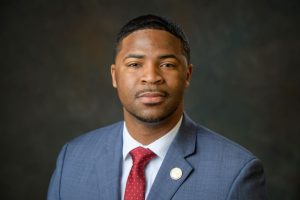Welcome Dr. Rogers: Inaugural Director of Financial Well-Being
Inaugural Director of Financial Well-Being:

Gilbert Rogers Joins Carolina To “Prepare For What’s Next”
As a first-generation college student and the youngest of seven siblings, Gilbert Rogers got what he considers to be an early start on learning to appreciate the differences that individuals bring to the table through listening, learning, and absorbing information.
“Though we were in the same household, my siblings and I had totally different personalities,” he said. “We were all motivated in different ways, we thrived in different environments and most importantly, we could come to the same conclusion but take varying paths,” he said. Gilbert explained that those early lessons shaped his approach to financial education.
In February, Rogers began work as the University’s inaugural director of financial wellbeing, a joint initiative between the Dean of Students office and the Office of Scholarships and Student Aid. The role is designed to support Carolina students who are curious about the foundational tenants of financial wellbeing and to equip them with knowledge to carry with them throughout their lives.
“As I navigated growing up, attending college and studying finance, I realized there was a lot to learn,” Rogers said. “My parents prepared me the best they knew how, but many of my personal finance lessons were gained through experiences both good and bad.”
Gilbert said those experiences speak to the complexity of unpredictable life situations.
“An ongoing financial education program with timely and relevant education would have been the perfect supplement to help navigate college and prepare for life post-grad,” he said.
Rogers joins Carolina from the University of Oregon, where he most recently worked as a senior assistant director of financial wellbeing. He holds a Doctor of Education from Spalding University.
“I saw this as an opportunity to ensure that we teach students to take advantage of the college years and beyond, whether that means grad school or entering the workforce,” he said. “It’s clear that Carolina is investing in the current financial wellbeing and future financial success of our students.”
He hopes to implement a peer-to-peer model for students to serve each other as we build a community of wellbeing. By fostering experiential learning opportunities for Carolina’s undergraduate, graduate, and professional students, Rogers hopes the peer approach to financial wellbeing will allow students to sharpen their presentation skills, expand their campus networks, gain client-facing experience, and build personal finance knowledge.
“Anyone can get in front of a group and talk about personal finance,” Rogers said. “But the question is: Can you make it stick? We will strive to set the standard for what financial education can be and meet students where they are to deliver timely and thoughtful financial education.”
Rogers hopes to create learning opportunities for students around multiple topics, including how to build credit, address student loan debt, and learn about investing. He aims to reach students from varying levels of need to support — from those from lower-income households to those who come from more support.
“By receiving financial education early on as a college student, you’re getting a five-to-seven-year jumpstart on your financial future. That could mean the difference of $300,000 to $400,000 over time, for example. By giving students these foundational skills early on, we’re changing their trajectory for financial success.”
During his first few months, Rogers hopes to learn more about the Carolina community, grow partnerships among students, faculty, and staff, and build a team that’s representative of the entire student body — all in service of the state.
“It’s all part of a bigger vision, and that bigger vision is ensuring that Carolina students are prepared for what’s next. … Seeing that lightbulb flip on — that gives me joy and motivates me to do more.”